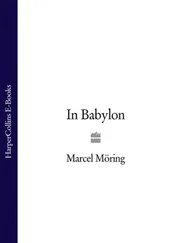* * *
I don’t know how that idea for a Spring Celebration got started in my head. We never did that kind of thing in the house, neither drinks nor celebration, much less for springtime. When we have friends in, it’s never more than six people sitting around a table. Early on I’d wanted to do something with girlfriends from the Pasteur, along with a few of Pierre’s colleagues, and then I thought of other names, I began to envision some more or less fruitful interactions, and right away the question of chairs came up. Pierre said, “Borrow some chairs from the Manoscrivis upstairs.”
“Without inviting them?”
“Yes inviting them. She could even sing!”
The Manoscrivi pair didn’t interest Pierre, but if anything he found Lydie more amusing than Jean-Lino. I sent out forty or so invitations. I immediately regretted it. I lay awake the whole night. How was I going to seat all those people? We had seven chairs, counting the Moroccan thing. The Manoscrivis probably had about the same number. The big Moroccan chair was a pest but how could we get it out of the way? Aside from the chairs, the soft hassock and the couch together could, given an ideal synergy-combination, seat another seven people. Three times seven makes twenty-one. Plus a stool from the basement—so all right, twenty-two. (I’d considered the chest as well, but the chest had to serve as another surface along with the coffee table.) We’d need ten more chairs, but folding ones. They’d have to be foldable so they could be unfolded as needed and not stand there open as if they were waiting for spectators, but where would I get folding chairs? The apartment wasn’t spacious enough to allow for thirty unfolded chairs, not to mention the icy uniformity of rental chairs. And why would we need so many chairs? When you give that kind of informal buffet supper—yes, informal!!—people don’t all sit, they talk standing up, they move around, you have to expect some back-and-forth, random sitting, people perch on chair arms or squat on the floor, relaxed, leaning against the wall, of course! About the glasses . . . I got up in the night to count how many we had. Thirty-five, various kinds. Plus six champagne goblets in another cupboard. In the morning I told Pierre, We have no glasses. Got to buy twenty champagnes and some wineglasses. Pierre said he’d seen plastic champagne goblets. I said, Ah no, absolutely not, I’m already unhappy having paper plates, the glasses have got to be glass. Pierre said it’s stupid to buy goblets we’ll never use again. I said, We’re not drinking champagne out of plastic like at some office retirement party! Pierre said, They sell these superrigid imitation-glass flutes that are just fine. I looked on the Internet and ordered three boxes of ten “Elegance” champagne flutes each and three boxes each holding fifty disposable knives, forks, and spoons in metallized plastic, stainless-steel style. That calmed me down until the Saturday afternoon of the party when I had a new crisis about the glasses. We had champagne goblets but no wineglasses. After wandering around the Deuil-l’Alouette shops, I came home with thirty wineglasses. And a carton of six champagne goblets. I pulled out a never-used tablecloth, laid it on the chest, and set out all the cups, the champagne glasses, the wineglasses, the hybrids, and even four little vodka glasses in case someone wanted vodka. There were more than a hundred glasses counting the ones from the kitchen. Lydie came to the door at six o’clock, already partly done up, with a chair on either arm. We went upstairs to get the others. There was a yellow velvet armchair in the bedroom. I had never seen their bedroom. The same space as ours except ten times as colorful, ten times more bordello-like, icons on the wall, a poster of Nina Simone half-naked in a white string dress, and the bed in a different position. Eduardo the Cat lay among the pillows, mistrustful and languid. “What are you doing there!” Lydie cried. She clapped her hands and the cat took off. She said, “I don’t allow him in the bedroom.” I saw what looked like a chamber pot with a wooden lid. In a glance I could tell that Jean-Lino had had no say in the interior decoration, not that you could make out his personal touch elsewhere either, but the rest of the apartment had more the feel of the random compromise between lives. The window was half-open, framed in silky panels like a British candy box, floating gently; in the distance over the apartment buildings you could make out a bit of the Eiffel Tower not visible from our flat. Their bedroom seemed gayer, more youthful than ours. Lifting the very heavy armchair, I was jealous of their bedroom. I have often been weighed down by the bedrooms in my life. Childhood room. Hospital rooms. Hotel rooms with a lousy view. It’s the window that makes the room. The space it outlines, the light it brings in. And its curtains. Those sheer panels! I’ve been in the hospital three times in my life, counting childbirth. Each time I’ve been oppressed by the hospital room with its big, slightly frosted windows showing a symmetrical row of buildings, or lopped branches, or an overexpansive sky. The hospital room drained me of hope each time. Even with the baby nearby in his glass cradle.
* * *
One of Robert Frank’s best-known photos is a view of Butte, a mining town in Montana, taken from the window of a hotel room. Rooftops, warehouses. Smoke in the distance. Half the landscape is blocked on either side by net curtains. The childhood bedroom I shared with my sister Jeanne looked out partly on the wall of a gymnasium. The stucco was crumbling off in great chunks. If I leaned to the left, I could see a street without people but with a bus stop. We lived in Puteaux in a brick apartment house, since demolished (I’ve gone by there, I recognize nothing). We had exactly those same curtains, the same weave, the same slightly rumpled broad vertical border. They opened on the same dismal picture of the world. The window ledge was the same too. A ledge in soiled stone, too narrow, supporting nothing. The Butte hotel room looks out on some dreary shacks and an empty highway. The one in Puteaux gave onto a rear wall with no openings. You would never have put that kind of fabric in front of a glorious thing. I told Lydie, “I worry this armchair will be bulky.” “Yes, yes, at worst we can take it down later.”
She led me into the living room. She had created a little jungle on the balcony, the boxlike kind of terrace they put on modern buildings, the sort you don’t go out onto much. There was a big mimosa spreading its branches that you could see from below.
Potted shrubs were budding. Sometimes the water she poured on them would splash down onto our terrace. I said, “It’s wonderful, your balcony.” She showed me her sprouting tulips and some crocuses that had bloomed that very morning. “You need anything else? Plates, glasses?”
“I think I have enough.”
“While you’re here, could you sign a petition against grinding up baby chicks?”
“They grind up baby chicks?”
“The males. They can’t become hens so they’re chopped up alive in the grinding machines.”
“How horrible!” I said as I added my name and signature to a list.
“Napkins? I have these napkins in a crumpled linen that don’t need ironing.”
“I have everything I need.”
“Jean-Lino went down to buy some champagne. And to smoke his little Chesterfield.”
“You shouldn’t have.”
“Please.”
She was much more excited than I was. My anxiety attacks had exhausted me and the party loomed like a punishment. Her pleasure made me ashamed. I found her touching and sweet. She hadn’t expected this invitation from neighbors she saw as condescending. We left the flat with three more chairs. Downstairs I said, “This is perfect, thanks so much, Lydie, now let’s go make ourselves beautiful!”
Читать дальше

![Ясмина Сапфир - Охотница и чудовище [СИ]](/books/35157/yasmina-sapfir-ohotnica-i-chudoviche-si-thumb.webp)
![Ясмина Реза - Бог резни [=Бог войны]](/books/63616/yasmina-reza-bog-rezni-bog-vojny-thumb.webp)
![Ясмина Реза - Бог войны [=Бог резни]](/books/63617/yasmina-reza-bog-vojny-bog-rezni-thumb.webp)








